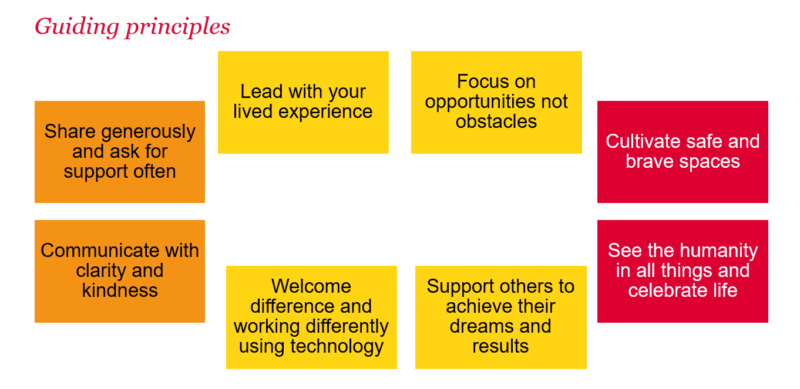Q members gathered in July for an hour and a half open and compassionate conversation about the ongoing challenges they face as we begin to turn from pandemic response to creating a sustainable health and care service. Community Space is a new bi-monthly event for Q members to renew connections, learn and collaborate. It is a safe and supportive space for members to share reflections and consider fresh approaches to service and staff recovery.
Connection: the power of collective silence
To open the session, everyone was invited into a collective silent pause to centre ourselves on a theme emerging in our current work. Members then shared reflections ranging from the difficulty of their ongoing workload and managing the pressures of COVID-19, to the crucial need for an open and psychologically safe space at work.
Picking up on the theme of ‘psychological safety’, Hilda Campbell introduced a set of practical guiding principles for building this kind of environment:

Sharing impressions on ‘toxic positivity’, Hilda made an observation that positivity, if used as camouflage for how we are really feeling, can discourage us from acknowledging that we are in difficulty and need help. This phrase triggered a discussion about how important it is to create an empowering and emotionally authentic environment for improvement to take place.
QI during the pandemic
We heard from two members who carried out Q Exchange projects during the pandemic that have now reached implementation stage.
To see Gill’s and Victoria’s presentations in full, watch the recording of the session.
Gamification of Human Factors
In October 2019 a multi-disciplinary team co-ordinated by Northern Ireland’s Health and Social Care Trust started a project to apply gaming principles and concepts to human factor learning in health and social care. The aim of the project was to offer the training to the maximum number of staff possible and increase learners’ motivation by making it fun. A gaming app, Human Factors in Healthcare (now available on both the App store and Google play) that staff could download on their phones seemed an ideal way to achieve both these goals.
Having a Trust-led team in place meant that the project team was able to quickly pull together their gaming strategy, missions and characters. They faced many challenges along the way, including a key member having to leave the project team following the onset of COVID-19. Members heard practical insights about the key elements involved in developing a digital learning tool. These included the importance of having multi-disciplinary input into the content and design of the learning journey; formal ownership over intellectual property; a tight, clear specification for the app before procuring a supplier; and contingency budget for quality testing the product to ensure that it is accepted into the marketplace.
Improvers without Borders
Members reflected on their need to have the space to talk about quality improvement, to share, collaborate, connect and support each other.
Improvers Without Borders is a collaborative approach to facilitating ‘wicked’ system wide problems from diagnosis through to improvement, while building QI capacity and capability through ‘learning by doing’. A partnership project co-ordinated by Gloucestershire Hospitals NHS Foundation Trust, the project team chose palliative and end of life care strategy development as their ‘wicked problem’ just as the pandemic hit. Through funding from Q Exchange, they were able to hire a project manager to pull together around 130 staff from the Gloucestershire Integrated Care System. The team studied performance and system data to develop an overview of this area of care. Through a series of three online workshops, they used value mapping to identify shared areas of concern and co-design a new strategy for end of life care.
Because of the impact of COVID on the workspace, the project was forced to move its workshops online. While there were challenges with moving to a virtual working system, the online workshops allowed for more individuals to attend. The team chose not to use the term ‘quality improvement’ to describe the work, and people involved in the project were able to use their skills and knowledge without needing to take formal QI training or join a QI collaborative. This meant that, while everyone on the project was doing QI, some may not have recognised it as such.
The project team is now writing up the approach and outcomes of their work to share with the wider Q community.
Connecting through Community Space
During the session, we heard a strong desire in the community to keep connecting with people in improvement. Members are being expected to lead teams through the new improvement world post-COVID and, because of this, having a space to connect and learn from the experiences of others was recognised as valuable, motivating and helpful in thinking creatively. Members reflected on their need to have the space to talk about quality improvement, to share, collaborate, connect and support each other. To be less alone in navigating complex systems; “Space and time together nurtures us. We’re all facing similar challenges – we can share, and know we’re going in the right direction.”
Join us for the second Community Space workshop on Thursday 23 September 2021.
This series is an interactive space for you to collaborate and learn with fellow members from across the UK and Ireland. It’s a space where we will support you to reflect on and share what you have learned during the pandemic and explore how you can bring together the needs of staff and service recovery in your improvement work.